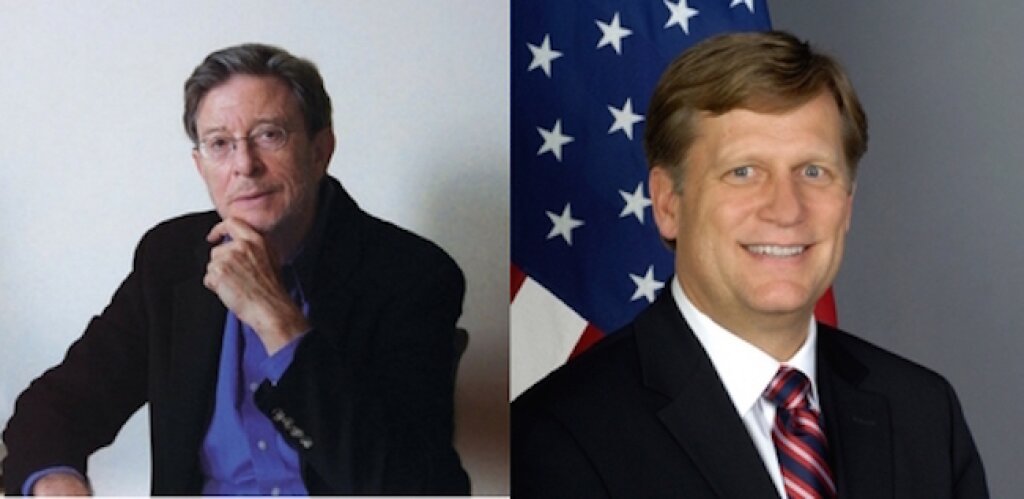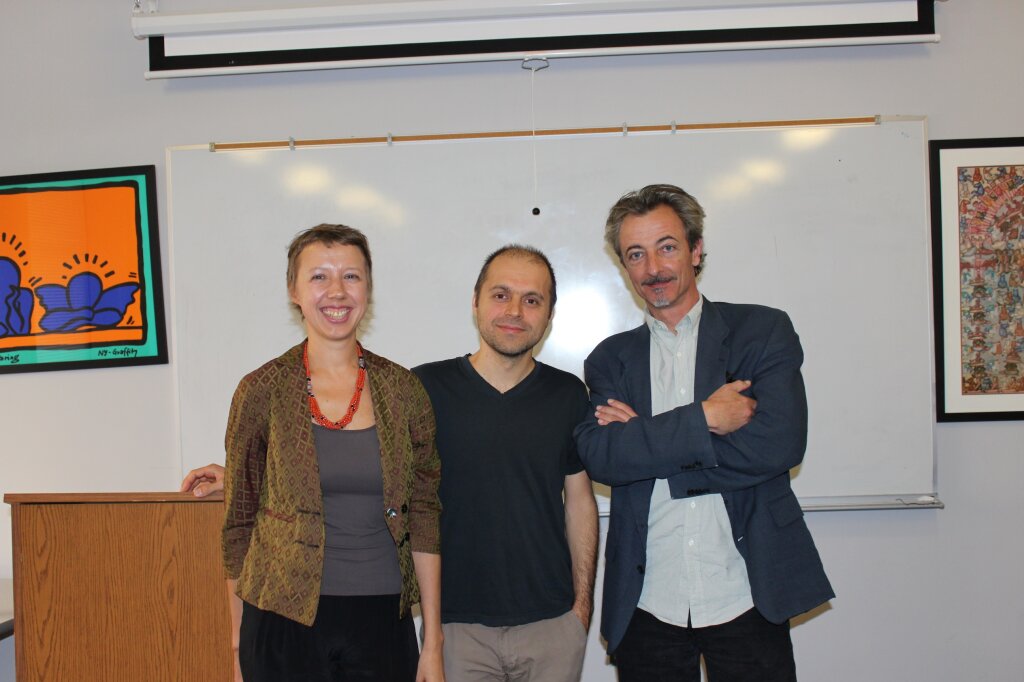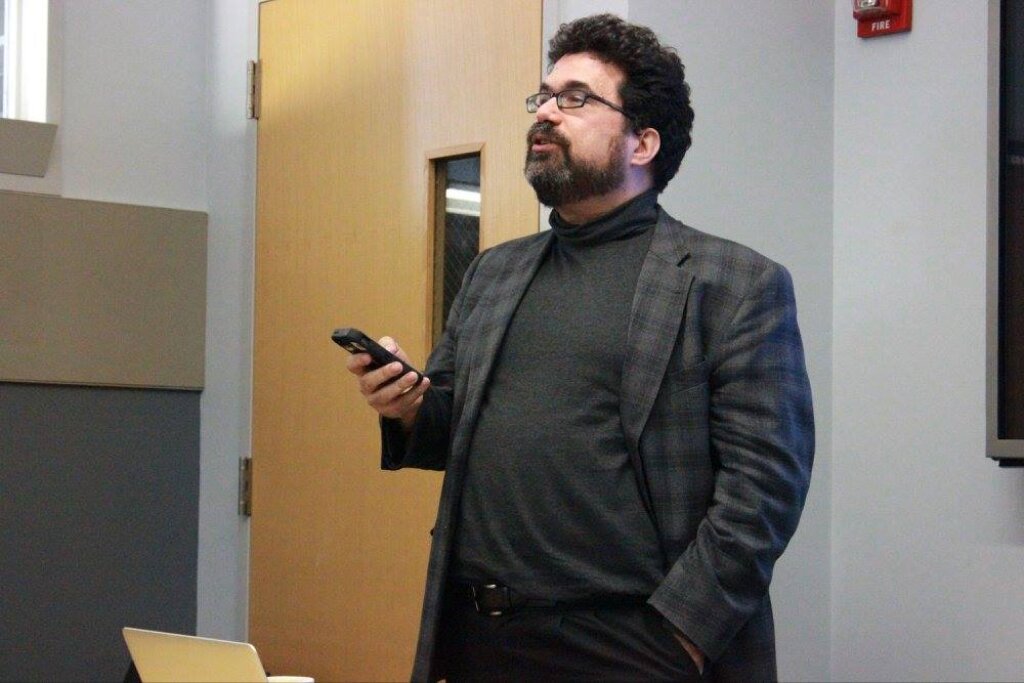Watch the event video here
US-Russia relations have been abysmal for years. Call it a new cold war or a “hot peace,” either way both countries now regard each other, in the words of innumerable Russiagate articles, as “a hostile foreign power.” Yet, within recent memory, Russia and the US cooperated on a broad range of issues. Relations may have been stiff, but they were functional. What happened, and who is to blame?
To answer that question, Stephen F. Cohen debated Michael McFaul on May 9 at Columbia University. Cohen is a professor of Russian studies and history emeritus at New York University, as well as a professor of politics emeritus at Princeton University. McFaul is a professor of political science at Stanford University and the former US ambassador to Russia under the Obama administration. The debate was part of New York Russia Public Policy Series jointly sponsored by NYU’s Jordan Center for the Advanced Study of Russia and Columbia University’s Harriman Institute, and can be viewed here.
While both men agreed that the present hostilities between the US and Russia were an avoidable “tragedy,” they clashed on the proximate causes and where to assign the blame.
Cohen argued that Russia only soured on the West, and the US in particular, after years of disrespect and broken promises. The pattern was set as early as 1990, when Soviet President Mikhail Gorbachev agreed to a reunified Germany within NATO, so long as major Western powers promised that their military alliance would creep no farther to the east. Today, of course, NATO members sit right on Russia’s mainland border in the form of Estonia and Latvia. Two more ex-Soviet republics, Ukraine and Georgia, have periodically flirted with joining the alliance, which Russia has long viewed as impinging on/constraining its interests.
Throughout the 1990s and 2000s, US leaders were infected with a swaggering “triumphalism,” Cohen claimed, which led them to treat Russia as a defeated opponent rather than a partner. The United States meddled in Russian politics in ways far exceeding today’s Russiagate allegations, for example dispatching advisers to shore up Boris Yeltsin's foundering 1996 reelection campaign. Even after Yeltsin was replaced by the much sterner Vladimir Putin, the Bush administration squandered Russia’s post-9/11 goodwill with a unilateral invasion of Iraq, expansion of missile defense systems in Europe, support for so-called “color revolutions” in post-Soviet states, and withdrawal from the 1972 anti-ballistic missile treaty. A backlash was inevitable, Cohen said, and could have taken a form far worse than Putin’s anti-Western turn.
“The backlash that was coming, anyone could have seen it, could have been a lot worse than Vladimir Putin,” Cohen said. “A lot worse.”
The election of Barack Obama and Dmitry Medvedev to their respective country’s presidencies cleared the way for a 2009 “reset” in US-Russia relations, but even the reset era was typical in that Russia gave much more than it got in return, according to Cohen. Russian cooperation enabled the US to establish a northern distribution network, or NDN, to support its war in Afghanistan, which in turn allowed the US to take actions, like the raid on Osama bin Laden’s Abbottabad compound, that jeopardized relations with (and supply chains through) Pakistan. Russia also agreed to help the US pressure Iran over its nuclear enrichment despite Russia’s strong ties with Iran, including substantial arms sales. In return, Russia got a relaxed visa regime with the US, an arms reduction treaty, and membership in the World Trade Organization—something that many Russians didn’t even want. In short, according to Cohen, Russia supported core US security interests and got back pittances that cost the US almost nothing.
Then, the Arab Spring happened. The Obama administration stood by while Egyptian President Hosni Mubarak was ousted in a popular revolt and then, even worse, supported a military intervention in Libya that resulted in regime change. Putin returned to the Russian presidency amid mass street protests of his own, the Kremlin began pumping out an unending stream of anti-US vitriol, and relations sank to the nadir they have occupied ever since.
McFaul challenged many of Cohen’s points, saying that US economic and political advisers only “meddled” in Russia during the 1990s at the invitation of the country’s democratically elected government. Likewise, while reset-era steps like Russian accession to the WTO and the START arms-reduction treaty might seem small compared to Russia’s concessions to the US, they were nonetheless Russian government priorities—and what else can any US administration do but negotiate with Russia’s elected leaders?
As a recent participant at the highest levels of US Russia policy, McFaul stressed the extent to which the two countries’ interests overlap in key ways. For example, Obama was able to maintain the US Manas airbase in Kyrgyzstan by convincing Medvedev that the US war in Afghanistan was also in Russia’s security interests, McFaul said. Moreover, the accomplishments of the Obama-Medvedev reset were real and substantial. For example, 2010 pogroms in Kyrgyzstan did not escalate into widespread ethnic cleansing, or even civil war, because of US-Russia cooperation, McFaul said.
“History can’t just be about the things you see. They have to also be about non-events. These get written out of history,” McFaul said. Kyrgyzstan’s 2010 upheaval was “the greatest, scariest non-event of my time at the White House,” he added—and timely talks between Obama and Medvedev helped a bad situation from becoming worse.
McFaul offered an alternative, and much more recent, explanation for today’s “hot peace” between the US and Russia, laying the blame squarely on Russian domestic politics. McFaul acknowledged various US missteps with regard to Russia during the Clinton and Bush administrations, but noted that relations remained relatively rosy until the end of Medvedev’s presidential term—despite what was then some two decades of NATO expansion and Western intervention. Instead, McFaul identified the real turning point as Putin’s 2011 decision to return to the presidency and subsequent mass protests in Russia. Putin saw the protests as a US-backed effort to unseat him in yet another “color” revolution and so cracked down hard on Russian civil society, NGOs, and protest leaders. To allay his growing unpopularity, he blamed Russia’s problems on foreign scapegoats, one of them Michael McFaul himself, who as US ambassador became the target of smear campaigns and harassment. He empowered right-wing forces and promoted the idea of Russia as the defender of traditional, conservative, and Christian values against the West’s decadent cosmopolitanism. By 2014, the annexation of Crimea, war in eastern Ukraine, and Western sanctions all solidified this narrative, pushing Putin’s popularity to an unprecedented high.
Audience questions touched on Russia’s role in the United States 2016 presidential election, alleged “kompromat” that Putin may have on Donald Trump, and Russia’s insistence on a special zone of influence in its “near abroad,” which refers to ex-Soviet countries along Russia’s border.
Cohen did not dispute that Russia intervened in the 2016 election on behalf of candidate Trump, but said that election meddling is the “jaywalking” of international affairs. All countries interfere in one another’s elections, rationally trying to get favorable candidates elected, he said.
Cohen also said repeatedly that he does not believe that Russia poses a threat to its neighbors, including Ukraine.
“I was just in Ukraine two weeks ago,” McFaul replied. “I just want to make sure that, when you’re in Ukraine, Russia still certainly feels like a threat.”
The two speakers ended by complimenting one another’s work, both agreeing that they respected their interlocutor while disagreeing with him. Both Cohen and McFaul also expressed a desire for further dialog on the topic.



